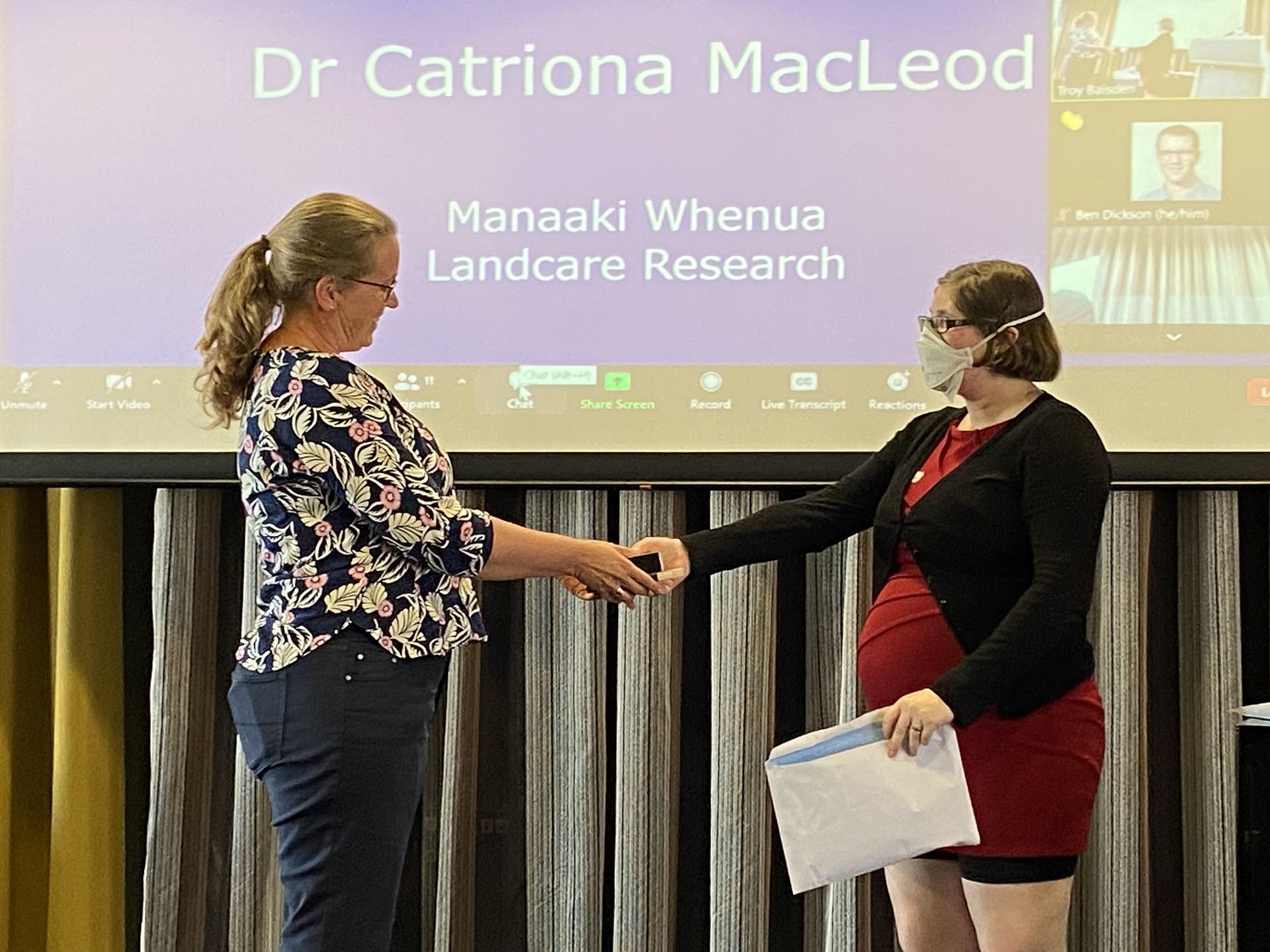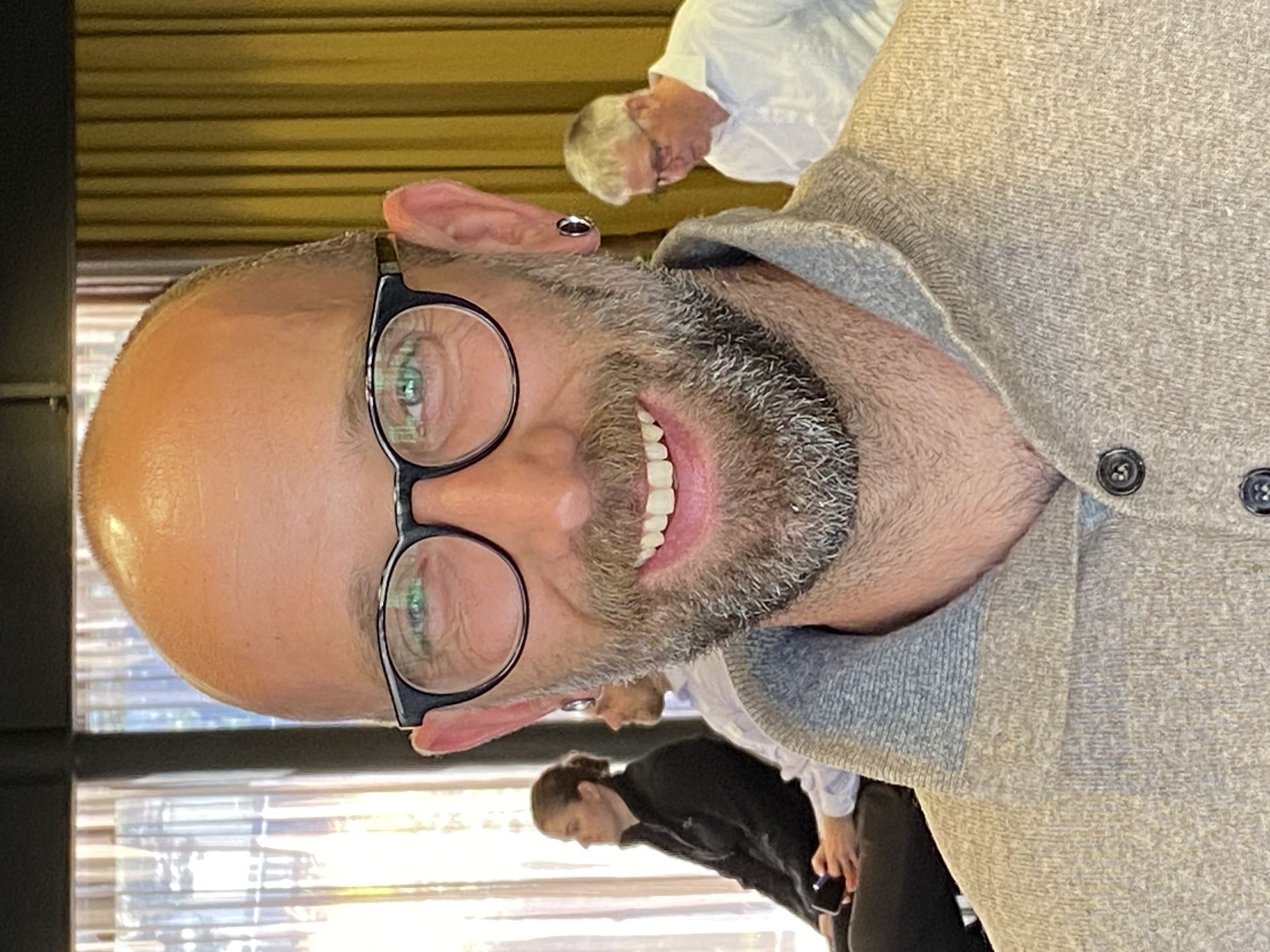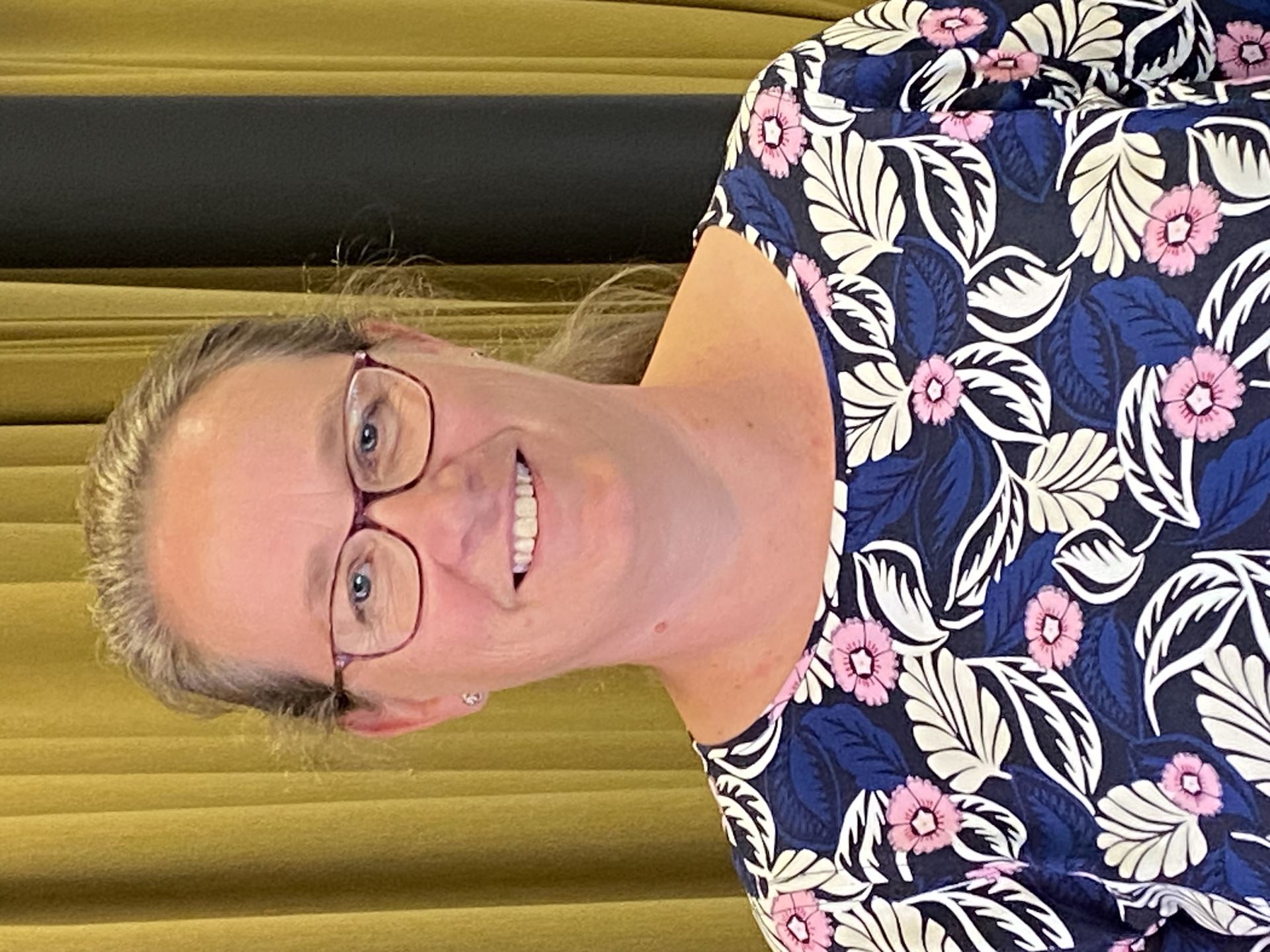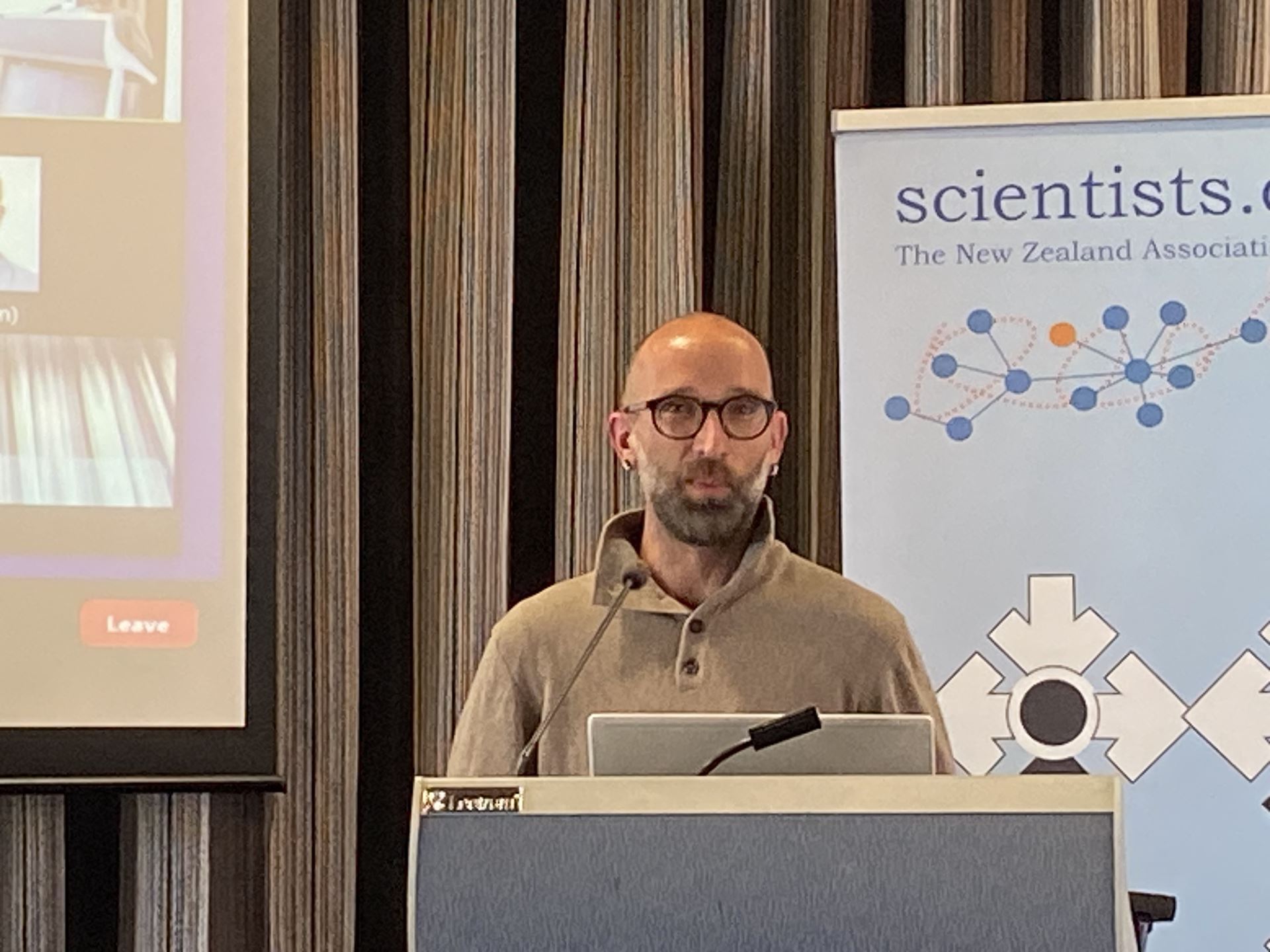The NZAS Medals for 2022 were presented on 14 November 2022, following the Association's Conference and AGM. Co-President Lucy Stewart presents the Cranwell Medal to Catriona Macleod (left). More pictures of the ceremonies are below the citations.

Marsden Medal 2022
 Professor Wickliffe Abraham has been awarded the 2022 Marsden medal for leveraging his standing as an internationally eminent neuroscientist to advance culturally competent neuroscience research and practice in Aotearoa New Zealand, to meet current and future societal needs.
Professor Wickliffe Abraham has been awarded the 2022 Marsden medal for leveraging his standing as an internationally eminent neuroscientist to advance culturally competent neuroscience research and practice in Aotearoa New Zealand, to meet current and future societal needs.
Prof Abraham is recognised and highly regarded for his contributions to the understanding of brain plasticity, in particular synaptic metaplasticity and its implications for human behaviour and mental health. Prof. Abraham’s ground-breaking work introduced a new way of thinking about the complex interactions involving neurons in the brain and its learning and memory systems. This new paradigm led to crucial insights into the mechanisms underlying addiction, chronic pain, and Alzheimer’s disease, enabling the development of diagnostic tools and therapies.
Equally important is Prof. Abraham’s focus on integration and collaboration within the neuroscience research community in Aotearoa New Zealand. As a founding co-director of Rangahau Roro Aotearoa Brain Research New Zealand, Prof. Abraham led its 80+ researchers and clinicians as they shaped a national, culturally informed response to our growing need for high-quality care of the ageing brain. Among Rangahau Roro Aotearoa’s many legacies are a network of independently managed Dementia Prevention Research Clinics and Kaupapa Roro o Aotearoa, the Aotearoa Brain Project. Like its predecessor, the new project aims to foster a workforce that mirrors the communities it serves and to facilitate translational neuroscience research that achieves equitable brain health outcomes for all New Zealanders. Its whakatauki, Ma te whiritahi ka whakatutuki ai nga pumanawa a tangata (Together, weaving: the realisation of potential), exemplifies the commitment to human connections, empowerment, and co-governance that characterise Prof. Abraham’s record of outstanding contributions to neuroscience research. More broadly, the whakatauki expresses the modus operandi required for Aotearoa’s current and future research landscape. This award honours Prof. Abraham’s impactful engagement towards realising this vision.
Hill Tinsley Medal 2022
 Associate Professor Daniel Stouffer (University of Canterbury) is a leading community ecologist in the School of Biological Sciences at the University of Canterbury. Dr Stouffer uses novel computational, statistical, and mathematical approaches to solve a range of problems across ecology and is particularly interested in the role of species interactions in driving emergent ecological and evolutionary phenomena. A chemical engineer by training, Dr Stouffer’s work has shed light on both the causes and consequences of interactions between species, and has advanced our understanding of predator–prey interactions, competition between plants, and mutualistic interactions between flowering plants and their pollinators, among many other topics. His work over the past few years has had an exceptional impact published in the most prestigious journals in the field. He is a firm believer that an academic’s success is reflected in their mentoring of early-career researchers with a particularly strong record of producing high-impact student and postdoctoral-fellow led publications, and in encouraging cultural and gender diversity in academia.
Associate Professor Daniel Stouffer (University of Canterbury) is a leading community ecologist in the School of Biological Sciences at the University of Canterbury. Dr Stouffer uses novel computational, statistical, and mathematical approaches to solve a range of problems across ecology and is particularly interested in the role of species interactions in driving emergent ecological and evolutionary phenomena. A chemical engineer by training, Dr Stouffer’s work has shed light on both the causes and consequences of interactions between species, and has advanced our understanding of predator–prey interactions, competition between plants, and mutualistic interactions between flowering plants and their pollinators, among many other topics. His work over the past few years has had an exceptional impact published in the most prestigious journals in the field. He is a firm believer that an academic’s success is reflected in their mentoring of early-career researchers with a particularly strong record of producing high-impact student and postdoctoral-fellow led publications, and in encouraging cultural and gender diversity in academia.
Shorland Medal 2022
 Associate Professor Geoffrey Waterhouse (University of Auckland) is an internationally-renowned materials scientist and expert in the applications of nanotechnology in catalysis, environmental monitoring, therapeutics and food technology. He has undertaken ground-breaking research on low-cost nanocatalysts that can replace precious-metal catalysts in devices such as water electrolysers, fuel cells and rechargeable batteries. His expertise in synchrotron X-ray absorption techniques is very highly sought-after by the international community, as evidenced by numerous highly productive collaborations, as well as providing leadership in building NZ’s capability in synchrotron science. Geoffrey is a key researcher/leader in many NZ Government-funded programmes linked to the emerging Green Hydrogen Economy. The impact of his research is manifested in his extraordinarily high citation statistics (351 articles, nearly 26,000 citations, h-index 79, i10-index 258), mostly based on his research of the last seven years. His numerous accolades include chief editorship of an emerging Food Science/Technology journal, NZIC’s Maurice Wilkins Prize, University of Auckland Research Excellence Medal and a 2021 James Cook Research Fellowship.
Associate Professor Geoffrey Waterhouse (University of Auckland) is an internationally-renowned materials scientist and expert in the applications of nanotechnology in catalysis, environmental monitoring, therapeutics and food technology. He has undertaken ground-breaking research on low-cost nanocatalysts that can replace precious-metal catalysts in devices such as water electrolysers, fuel cells and rechargeable batteries. His expertise in synchrotron X-ray absorption techniques is very highly sought-after by the international community, as evidenced by numerous highly productive collaborations, as well as providing leadership in building NZ’s capability in synchrotron science. Geoffrey is a key researcher/leader in many NZ Government-funded programmes linked to the emerging Green Hydrogen Economy. The impact of his research is manifested in his extraordinarily high citation statistics (351 articles, nearly 26,000 citations, h-index 79, i10-index 258), mostly based on his research of the last seven years. His numerous accolades include chief editorship of an emerging Food Science/Technology journal, NZIC’s Maurice Wilkins Prize, University of Auckland Research Excellence Medal and a 2021 James Cook Research Fellowship.
Cranwell Medal 2022
 Dr Catriona MacLeod (Manaaki Whenua Landcare Research) demonstrates the complex set of skills and leadership that is required for effective science communication - combining an understanding of human behaviour, social science, psychology, and visual and verbal tools to find a common language between senders and receivers. She led the Trustworthy Biodiversity Indicators programme, creating an exciting yet respectful conversation between scientists and people in diverse communities, applying creative ways to engage on a range of platforms, from social media channels through to group discussions kanohi ki te kanohi. During that programme, Catriona led the development of comprehensive cutting-edge analytical tools to process the massive amount of data collected from the annual NZ Garden Bird Survey and then present the results in ways that are easily understandable to the public of Aotearoa; engagement by public in the survey increased substantially over four years. She has also recognised the need to communicate in Te Reo and has worked with Maori to ensure the messaging is relevant to them. Part of her success lies in her recognition of a distinct Aotearoa psyche, as seen in her chocolate fish index, and the story of Tui. She has developed a stunning template that other science communicators might wish to build on to engage in the critical task of communicating science effectively.
Dr Catriona MacLeod (Manaaki Whenua Landcare Research) demonstrates the complex set of skills and leadership that is required for effective science communication - combining an understanding of human behaviour, social science, psychology, and visual and verbal tools to find a common language between senders and receivers. She led the Trustworthy Biodiversity Indicators programme, creating an exciting yet respectful conversation between scientists and people in diverse communities, applying creative ways to engage on a range of platforms, from social media channels through to group discussions kanohi ki te kanohi. During that programme, Catriona led the development of comprehensive cutting-edge analytical tools to process the massive amount of data collected from the annual NZ Garden Bird Survey and then present the results in ways that are easily understandable to the public of Aotearoa; engagement by public in the survey increased substantially over four years. She has also recognised the need to communicate in Te Reo and has worked with Maori to ensure the messaging is relevant to them. Part of her success lies in her recognition of a distinct Aotearoa psyche, as seen in her chocolate fish index, and the story of Tui. She has developed a stunning template that other science communicators might wish to build on to engage in the critical task of communicating science effectively.

Associate Professor Daniel Stouffer accepts the Hill-Tinsley award.

Professor Wickliffe Abraham accepts the Marsden medal.
© 2022 NZAS | Disclaimer Sitemap |